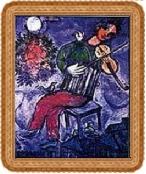|


Buy
these Art Prints At AllPosters.com
 Primitivism
The tendency of artists of the late 19th century to take
interest in the art of the Far East, and to look for new ways of expression,
influenced Paul Gauguin
Primitivism
The tendency of artists of the late 19th century to take
interest in the art of the Far East, and to look for new ways of expression,
influenced Paul Gauguin ,
who traveled to Tahiti and painted the islanders. Gauguin,
who, along with Van-Gogh ,
who traveled to Tahiti and painted the islanders. Gauguin,
who, along with Van-Gogh ,
searched for the most direct way to express emotion in painting, and found
the natural way in "primitive" art, unspoiled by strict academic
rules common in the Western world. He admired the craft of the local
natives, and tried to learn their view of reality. He was proud of the
title "barbaric", used to describe his style. He painted in a
simple, unsophisticated manner, using big colour stains, and created pictures
that paid little attention to depth and perspective, being somewhat flat
painting.
Primitivist artists took pride
in their ability to speak to the common person. Unlike artists of
other schools, whose greatness was difficult to comprehend by the larger
audience, it is very easy to identify with a painting of this style. Followers
of this trend prided themselves on their "closeness to the soil".
Henri Rousseau ,
searched for the most direct way to express emotion in painting, and found
the natural way in "primitive" art, unspoiled by strict academic
rules common in the Western world. He admired the craft of the local
natives, and tried to learn their view of reality. He was proud of the
title "barbaric", used to describe his style. He painted in a
simple, unsophisticated manner, using big colour stains, and created pictures
that paid little attention to depth and perspective, being somewhat flat
painting.
Primitivist artists took pride
in their ability to speak to the common person. Unlike artists of
other schools, whose greatness was difficult to comprehend by the larger
audience, it is very easy to identify with a painting of this style. Followers
of this trend prided themselves on their "closeness to the soil".
Henri Rousseau ,
an amateur painter who learned to draw almost by himself (like Van-Gogh
and Gogin), painted spontaneously, and without any experience, paintings
that were later considered to match this trend, works that are a spectacular
example of the simple, unpretentious painting. Marc
Chagall ,
an amateur painter who learned to draw almost by himself (like Van-Gogh
and Gogin), painted spontaneously, and without any experience, paintings
that were later considered to match this trend, works that are a spectacular
example of the simple, unpretentious painting. Marc
Chagall combined the almost-childish painting idealised by the primitivists with
the folklore of the Jewish town in which he grew up.
In music, Stravinsky
combined the almost-childish painting idealised by the primitivists with
the folklore of the Jewish town in which he grew up.
In music, Stravinsky tried, in the dawn of the 20th century, to rephrase a new musical language.
Subjects of Paganism in the ballet "The Rite
of Spring"
tried, in the dawn of the 20th century, to rephrase a new musical language.
Subjects of Paganism in the ballet "The Rite
of Spring" ,
like the rhythmical novelty including polyrhythm, and sharper dissonances
in his pieces, were among the most important innovations of this century.
His style was also called by critics (and those were
numerous) "primitivism" and "barbarism". In
contrast, one may see the tendency to paint in a style that would fit the
common person as similar to Hindemith's ,
like the rhythmical novelty including polyrhythm, and sharper dissonances
in his pieces, were among the most important innovations of this century.
His style was also called by critics (and those were
numerous) "primitivism" and "barbarism". In
contrast, one may see the tendency to paint in a style that would fit the
common person as similar to Hindemith's "functional music"
"functional music" . .
|